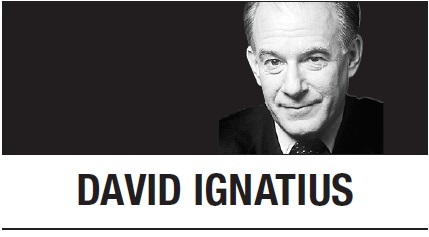 At a time when America is facing a potential military confrontation with Iran, an escalating trade war with China and a showdown with North Korea, you’d think President Donald Trump would want a permanent secretary of defense to oversee Pentagon plans.
At a time when America is facing a potential military confrontation with Iran, an escalating trade war with China and a showdown with North Korea, you’d think President Donald Trump would want a permanent secretary of defense to oversee Pentagon plans.But Patrick Shanahan is still cooling his heels as acting secretary, awaiting a formal nomination that was expected nearly two weeks ago, after Shanahan was cleared in a conflict-of-interest probe. The nomination sits and waits, and some prominent Trump supporters who back Shanahan are beginning to voice concerns.
Newt Gingrich, former House speaker and a Trump confidant, told me Tuesday he thinks Shanahan would be a “very” good defense secretary and added, “I hope the president will nominate Shanahan as quickly as possible. It will strengthen Shanahan’s hand in reforming the Pentagon bureaucracy.”
Jack Keane, a Trump adviser and retired army general who could probably have had the Pentagon job himself if he‘d wanted it, says he’s also mystified by the delay. Asked if Shanahan should be nominated, Keane said, “I definitely think so,” because it would boost his standing in dealing with allies and potential adversaries.
Keane explained, “In my discussions with (Shanahan), I’m convinced he understands the issues and is seized with the urgency to reform the department.” Gingrich offered a similar assessment of Shanahan as a potential change agent: “Shanahan has a clear vision of the technology investments needed to maintain superiority over the Chinese military and the management experience with big systems to turn that vision into reality.”
So why, at a time when Shanahan is gaining Republican Party support after a somewhat tepid initial reaction, is the president waiting? As with so many aspects of Trump’s behavior, it’s a mystery. Maybe he thinks the optics aren’t right, given that Shanahan was a former top executive at Boeing, a company that’s now mired in controversy over the 737 Max. Perhaps he wants a bigger name that will add luster to his administration.
Or maybe, as Trump has shown in his treatment of former Secretary of State Rex Tillerson, former Secretary of Homeland Security Kirstjen Nielsen and former Secretary of Defense Jim Mattis, the president just likes to keep people dangling in limbo, to the point of personal humiliation.
Whatever the reason, the White House’s reluctance to designate a permanent successor to Mattis is threatening to become a Trump “moment,” adding to speculation about uncertain presidential decision making at a time when he has big national security problems accumulating in a wobbly stack that includes Iran, China and North Korea -- not to mention Russia, Venezuela, Turkey and Syria.
Shanahan’s priorities, should he be nominated and confirmed, seem clear. The former Boeing production engineer wants to consolidate and modernize a Pentagon bureaucracy that’s notoriously stove-piped and resistant to change. In setting his tentative agenda, he has worked closely with Gen. Joseph Dunford, the widely respected chairman of the Joint Chiefs of Staff.
The approach Dunford and Shanahan have discussed would seek to better coordinate the geographical nodes, known as combatant commands, that now dominate resources and planning. Rather than segmenting the world through these regional commands, the aim would be to focus more top-level attention on China and Russia, the global strategic priorities. Shanahan wants senior leaders to devote at least 10 percent of their time collectively to China, and 10 percent to Russia.
Dunford described the global planning effort in an interview April 25. Without explicitly endorsing Shanahan, he said that his management experience would be a plus in reforming past practices at the Pentagon. “The only way you can drive a cultural change in the Pentagon is if the secretary of defense makes it a priority. Shanahan came in without any baggage about how we used to do things. ... As a business executive, he‘s interested in outcomes.”
Shanahan faced considerable skepticism when he was named acting secretary last December. Critics worried that he lacked Mattis’ military experience and personal stature -- and a willingness to push back against Trump, when necessary. Those questions persist, but Shanahan has won some converts among those, like Gingrich and Keane, who favor modernizing the Pentagon’s hide-bound systems and its preservation of legacy weapons.
Shanahan’s boosters argue that he is a tough manager who’s willing to knock heads and who understands the technologies -- from space systems to artificial intelligence to cloud computing -- that will be central to any Pentagon transformation.
But after more than four months with a vacancy at the top of the Pentagon, the biggest argument in Shanahan’s favor is simply that America needs a defense secretary -- now.
David Ignatius
Follow David Ignatius on Twitter: @IgnatiusPost -- Ed.
(Washington Post Writers Group)

















![[KH Explains] Hyundai's full hybrid edge to pay off amid slow transition to pure EVs](http://res.heraldm.com/phpwas/restmb_idxmake.php?idx=652&simg=/content/image/2024/04/18/20240418050645_0.jpg&u=20240418181020)

![[Today’s K-pop] Zico drops snippet of collaboration with Jennie](http://res.heraldm.com/phpwas/restmb_idxmake.php?idx=642&simg=/content/image/2024/04/18/20240418050702_0.jpg&u=)